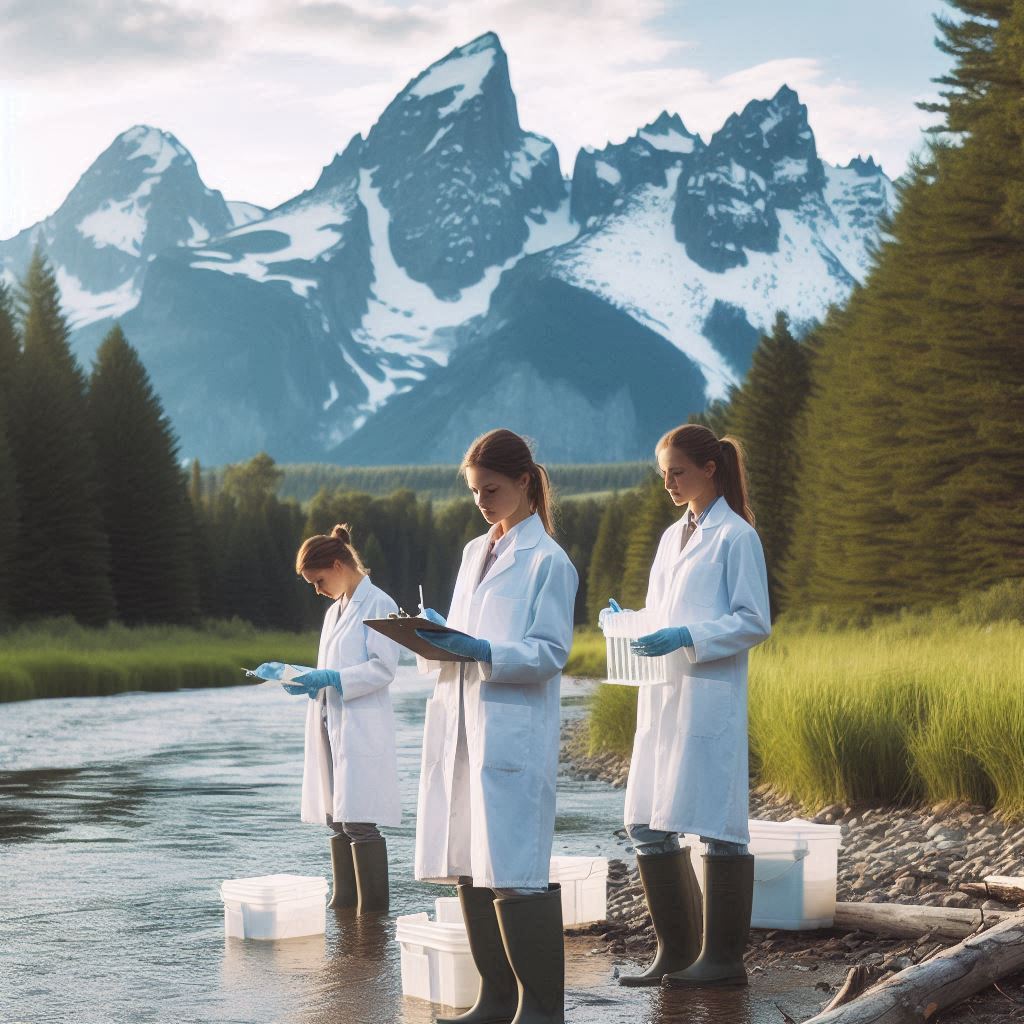Introduction
Hydrologists and geologists both study the Earth, but their focuses differ significantly.
Hydrologists specialize in water systems, analyzing how water moves and interacts with the environment.
They assess water quality and manage resources for sustainability.
Hydrologists often work in fields related to water supply, environmental protection, and climate change.
In contrast, geologists examine the Earth’s structure, materials, and processes.
They study rocks, minerals, and geological formations to understand the planet’s history.
Geologists often focus on natural resources, such as oil, gas, and minerals, as well as natural hazards like earthquakes and landslides.
Understanding the differences between hydrologists and geologists is crucial for aspiring professionals.
Each career path requires unique skills, knowledge, and educational backgrounds.
Prospective students must consider their interests when choosing between these fields.
For example, those passionate about water conservation may prefer hydrology, while those intrigued by Earth‘s physical processes may gravitate towards geology.
Awareness of these distinctions helps employers identify suitable candidates for specific roles.
Recognizing the unique contributions of each discipline fosters collaboration between hydrologists and geologists, leading to better environmental management and resource utilization.
Ultimately, understanding these differences helps individuals make informed career choices.
Job Responsibilities of a Hydrologist
Understanding the Study of Water in Hydrology
Hydrologists focus on the study of water distribution, movement, and quality in the environment.
They analyze how water interacts with the atmosphere, soil, and living organisms.
This field plays a crucial role in managing water resources effectively.
Hydrologists investigate various components of the water cycle, including precipitation, evaporation, and runoff.
They study how these elements impact ecosystems and human activities.
Understanding these processes helps predict water availability and assess the impacts of climate change on water resources.
In contrast, geologists study the Earth‘s structure, composition, and processes.
They examine rocks, minerals, and the forces that shape the planet.
While both professions involve fieldwork and data collection, their focus areas differ significantly.
Conducting Field Investigations and Collecting Data
Field investigations are vital for both hydrologists and geologists.
Hydrologists conduct field studies to collect data on water sources, quality, and flow rates.
They install monitoring equipment to measure water levels, rainfall, and groundwater fluctuations.
This hands-on approach allows them to gather real-time data crucial for their analyses.
Hydrologists often sample water from rivers, lakes, and aquifers.
They test for contaminants and assess overall water quality.
This data informs decisions related to water management and environmental protection.
Geologists also conduct field investigations but focus on soil and rock samples.
They study geological formations and analyze mineral content.
This information helps geologists understand Earth‘s history and the processes that shape its surface.
Using Models and Simulations to Analyze Water-Related Issues
Hydrologists employ models and simulations to analyze water-related issues effectively.
They use software tools to create hydrological models that simulate water movement through different environments.
These models help predict how changes in land use or climate impact water resources.
Hydrological modeling assists in flood risk assessments, water quality evaluations, and groundwater management.
By simulating various scenarios, hydrologists can develop strategies to mitigate water-related challenges.
Their work supports sustainable water management practices and aids in planning for future water needs.
Geologists also use models but focus on geological processes.
They analyze how geological formations influence water movement and availability.
By studying subsurface geology, geologists can identify potential groundwater resources and assess risks related to land stability.
Career Path Comparisons
The career paths of hydrologists and geologists often intersect but have distinct focuses.
Hydrologists typically work in water resource management, environmental consulting, and government agencies.
They often collaborate with engineers, planners, and policymakers to address water-related challenges.
Geologists find employment in mining, petroleum industries, and environmental consulting.
They often work on projects related to resource extraction, land-use planning, and environmental assessments.
Both careers require strong analytical skills and a solid understanding of scientific principles.
Hydrologists and geologists play crucial roles in understanding Earth‘s systems.
Hydrologists focus on water distribution, movement, and quality, while geologists examine Earth‘s materials and processes.
Both careers involve field investigations and data collection, but their methodologies and areas of expertise differ.
Using models and simulations, hydrologists analyze water-related issues, supporting sustainable management practices.
As environmental challenges grow, both professions will remain vital for ensuring the responsible use of Earth‘s resources.
Aspiring professionals in either field can contribute significantly to environmental sustainability and resource management.
Read: Biology Ethics: Navigating Complex Issues in the US
Education and Training for Hydrologists
Educational Pathways for Hydrologists and Geologists
Both hydrologists and geologists typically start their careers with a bachelor’s degree.
Common majors include hydrology, geology, environmental science, or related fields.
This foundational education provides essential knowledge about earth systems, water resources, and environmental processes.
Aspiring hydrologists focus on water movement, distribution, and quality.
In contrast, geologists study the Earth’s materials, processes, and history.
While both disciplines overlap, their focus areas differ significantly.
A strong understanding of scientific principles is crucial for success in either field.
Advanced Degrees for Career Advancement
Many hydrologists and geologists pursue advanced degrees to advance their careers.
A master’s degree enhances expertise and opens doors to higher-level positions.
Graduate studies often involve specialized research in areas such as groundwater management or geological mapping.
For those interested in academic or research roles, a Ph.D. may be necessary.
Advanced degrees can lead to positions in academia, government research, or industry leadership.
With higher education, professionals often gain access to more complex projects and responsibilities.
Continuing Education and Professional Development
Continuing education plays a vital role in the careers of hydrologists and geologists.
Both fields require professionals to stay updated on the latest scientific advancements and techniques.
Many organizations offer workshops, webinars, and certification programs to support lifelong learning.
Participating in professional development opportunities enhances knowledge and skills.
These programs can cover new technologies, regulatory changes, and emerging research areas.
Engaging in such activities helps professionals maintain their competitive edge in the job market.
Moreover, many hydrologists and geologists join professional organizations.
Membership in these associations often provides access to valuable resources, including conferences, publications, and networking opportunities.
Building connections within the industry can lead to collaborative projects and job opportunities.
Comparison of Career Paths
While hydrologists and geologists share similar educational backgrounds, their career paths can diverge significantly.
Hydrologists often work on water resource management, environmental protection, and public policy.
They focus on ensuring sustainable water use and addressing water quality issues.
On the other hand, geologists frequently engage in natural resource exploration, environmental assessments, and land-use planning.
They often work in industries such as mining, oil, and gas, studying the Earth’s materials for extraction purposes.
Despite these differences, both fields offer rewarding career opportunities.
Professionals in hydrology and geology contribute significantly to environmental sustainability and resource management.
They address pressing global challenges, such as climate change and water scarcity.
Both hydrologists and geologists benefit from a strong educational foundation.
A bachelor’s degree in hydrology, geology, or environmental science is essential for entry-level positions.
Advanced degrees and continuing education opportunities further enhance career prospects and professional growth.
Aspiring professionals should carefully consider their interests and career goals when choosing between these two fields.
By pursuing the appropriate educational pathways and engaging in lifelong learning, they can build fulfilling careers that contribute to environmental stewardship and sustainability.
Both hydrologists and geologists play crucial roles in understanding and managing the Earth’s resources.
Read: The Impact of Technology on the Chemist Profession in the US
Job Opportunities for Hydrologists
Career Opportunities in Government Agencies, Environmental Consulting Firms, and Research Institutions
Both hydrologists and geologists find diverse career opportunities.
Government agencies often hire hydrologists to manage water resources and environmental programs.
Organizations like the U.S. Geological Survey (USGS) and the Environmental Protection Agency (EPA) employ hydrologists for research and monitoring projects.
Environmental consulting firms also seek hydrologists.
These firms assess water quality and develop strategies for managing water resources.
Hydrologists working in this sector analyze data and provide recommendations for sustainable practices.
Research institutions offer additional opportunities for hydrologists.
These organizations focus on advancing knowledge in water science.
Hydrologists at research institutions often conduct studies on climate change, hydrological modeling, and water quality.
Specialization Opportunities in Water Resource Management and Environmental Protection
Hydrologists have the opportunity to specialize in various areas.
Water resource management is a significant field for hydrologists.
This specialization involves managing water supply, demand, and distribution systems.
Hydrologists work with governments and communities to develop sustainable water use practices.
Another area of specialization is environmental protection.
Hydrologists in this field study the impact of human activities on water systems.
They assess contamination risks and develop strategies to mitigate environmental damage.
Specializing in environmental protection allows hydrologists to play a vital role in safeguarding natural resources.
Hydrologists can also focus on groundwater studies, flood risk assessment, or watershed management.
These specializations allow professionals to target specific challenges in the field.
As environmental issues become more complex, the demand for specialized hydrologists continues to grow.
Job Growth and Salary Trends for Hydrologists
Job growth for hydrologists remains positive.
The Bureau of Labor Statistics projects a steady increase in hydrology-related positions over the next decade.
Growing concerns about water scarcity and climate change drive demand for hydrologists.
They play a crucial role in developing strategies to manage water resources effectively.
Salary trends for hydrologists reflect this positive job outlook.
According to the Bureau of Labor Statistics, the median annual wage for hydrologists is competitive.
Factors influencing salary include education, experience, and location.
Hydrologists with advanced degrees and specialized skills often command higher salaries.
Geologists also experience similar job growth and salary trends.
However, hydrologists may earn slightly more due to the increasing importance of water resource management.
Both professions offer opportunities for career advancement, especially for those pursuing further education or certifications.
In summary, hydrologists and geologists enjoy diverse career paths with ample opportunities.
Government agencies, environmental consulting firms, and research institutions actively seek professionals in both fields.
Hydrologists can specialize in areas like water resource management and environmental protection, which are increasingly relevant.
Job growth remains steady, with competitive salaries reflecting the demand for skilled hydrologists.
As environmental challenges persist, both hydrologists and geologists will play vital roles in addressing water-related issues.
By choosing the right path, aspiring professionals can contribute meaningfully to sustainable resource management and environmental stewardship.
Read: US Chemistry Conferences and Symposiums to Attend in 2024
Job Responsibilities of a Geologist
Study of the Earth’s Composition, Structure, and History
Hydrologists and geologists both study the Earth, but their focuses differ significantly.
Geologists examine the Earth’s composition, structure, and history.
They explore how geological processes shape landscapes over time.
This includes studying rock formations, soil types, and tectonic activities.
Geologists analyze the physical and chemical properties of Earth materials.
They investigate how these materials interact with environmental factors.
In contrast, hydrologists focus specifically on water-related issues.
They study the distribution, movement, and properties of water in various environments.
Hydrologists often consider how water interacts with geological formations.
They assess groundwater levels, surface water bodies, and precipitation patterns.
Both professions play essential roles in understanding Earth’s systems, but their approaches vary.
Conducting Geological Surveys and Mapping
Geologists frequently conduct geological surveys to gather data about the Earth’s materials.
They utilize various tools and techniques for surveying and mapping.
These methods include field studies, remote sensing, and geophysical surveys.
Geologists create detailed maps of geological features, which aid in resource management and environmental planning.
Their work often supports industries like mining, oil, and gas exploration.
In comparison, hydrologists also conduct surveys but focus on water systems.
They gather data on groundwater levels, surface water flow, and quality.
Hydrologists use tools like stream gauges and piezometers to monitor water resources.
They often collaborate with geologists to understand how geology influences water movement.
This collaboration enhances the accuracy of assessments related to water availability and quality.
Identifying and Analyzing Rocks, Minerals, and Other Geological Materials
Geologists specialize in identifying and analyzing rocks, minerals, and sediments.
They classify these materials based on their physical and chemical properties.
This analysis helps them understand the geological history of an area.
Geologists often work in labs, using tools like microscopes and spectrometers.
Their findings contribute to resource extraction and environmental conservation efforts.
Hydrologists, while not primarily focused on rocks and minerals, recognize their importance.
They study how geological materials affect water movement and quality.
For instance, hydrologists analyze soil types to understand infiltration rates.
They consider how various rock formations impact groundwater flow.
Understanding the geological context is vital for effective water resource management.
Both hydrologists and geologists study the Earth, but their career paths differ significantly.
Geologists focus on the Earth’s composition, structure, and history, while hydrologists concentrate on water resources.
Both professions conduct surveys and analyze materials, but their specific goals vary.
Understanding these differences helps aspiring professionals choose the right path for their interests.
By recognizing the importance of both roles, we can better appreciate their contributions to understanding our planet’s systems.
Read: Key Roles and Responsibilities of a Chemist in the US

Education and Training for Geologists
Bachelor’s Degree in Geology or Related Field
Both hydrologists and geologists typically start with a bachelor’s degree.
A degree in geology or a related field is essential for both careers.
This foundational education provides critical knowledge about Earth’s processes, materials, and systems.
Hydrology focuses on water resources and their movement, while geology encompasses the study of rocks, minerals, and landforms.
Some universities offer specialized programs in environmental geology or hydrology.
Students should choose a program that aligns with their career goals.
Courses in chemistry, biology, and environmental science are beneficial for both fields.
They help develop a well-rounded understanding of natural systems.
Additionally, students should seek out elective courses related to hydrology, geomorphology, and geophysics.
These courses deepen their knowledge and prepare them for advanced study or professional work.
Transform Your Career Today
Unlock a personalized career strategy that drives real results. Get tailored advice and a roadmap designed just for you.
Start NowFieldwork Experience and Internships
Fieldwork experience is vital for both hydrologists and geologists.
Hands-on learning helps students apply theoretical concepts in real-world situations.
Many academic programs incorporate field studies and laboratory work.
These experiences provide practical skills essential for future careers.
Internships play a crucial role in gaining field experience.
Students should actively seek internship opportunities during their studies.
Internships allow students to work alongside professionals and learn about industry practices.
This experience is invaluable for building resumes and professional networks.
Both hydrologists and geologists can benefit from internships with government agencies, environmental organizations, or consulting firms.
These positions provide exposure to various projects, including environmental assessments and water resource management.
Internships often lead to job offers or valuable connections in the field.
Professional Certifications and Licensure for Some Positions
Professional certifications and licensure can enhance career prospects for both hydrologists and geologists.
While not always required, obtaining these credentials demonstrates expertise and commitment.
Many employers prefer candidates with relevant certifications.
Hydrologists may pursue certification through organizations like the American Institute of Hydrology.
This certification validates their knowledge and skills in the field.
Some states require hydrologists to be licensed to practice professionally.
Licensure often entails passing a comprehensive exam and completing continuing education requirements.
Geologists can also seek certification through organizations such as the American Society of Geologists.
Like hydrologists, some states require geologists to obtain licensure.
This often involves passing an exam and fulfilling experience requirements.
Both careers benefit from ongoing professional development.
Participating in workshops, conferences, and additional training enhances skills and knowledge.
Staying current with advancements in technology and regulations is essential for career growth.
Aspiring hydrologists and geologists share a common educational foundation.
A bachelor’s degree in geology or a related field is crucial.
Fieldwork experience and internships provide hands-on skills necessary for both careers.
Professional certifications and licensure can further enhance job prospects.
By understanding these paths, students can make informed decisions about their future careers in hydrology or geology.
Explore Further: Cultural Anthropology: Understanding Human Societies
Job Opportunities for Geologists
Opportunities in Energy Exploration, Environmental Consulting, Mining, and Academia
Both hydrologists and geologists have diverse career opportunities across various sectors.
Geologists often find positions in energy exploration, particularly in oil and gas.
They work with companies to locate and extract petroleum resources efficiently.
This sector offers lucrative opportunities, as energy demands continue to rise globally.
In environmental consulting, geologists assess the impact of construction and development on land.
They provide valuable insights into soil and groundwater conditions.
Their expertise helps companies comply with environmental regulations and mitigate risks.
These consultants often work with government agencies and private firms on remediation projects.
Mining is another significant area for geologists.
They conduct geological surveys to identify mineral deposits and assess their economic viability.
Geologists play a crucial role in ensuring sustainable practices within the mining industry.
They analyze geological data to optimize extraction methods and minimize environmental impacts.
Academia presents additional career paths for geologists.
Many choose to teach at universities and conduct research in various geological fields.
This role allows them to influence future generations of geologists and contribute to scientific advancements.
Specializations in Areas Such as Petroleum Geology, Environmental Geology, or Mineralogy
Geologists often specialize in different areas, tailoring their careers to specific interests.
Petroleum geology focuses on locating and managing oil and gas reserves.
Professionals in this field analyze rock formations and reservoir characteristics.
They collaborate with engineers to maximize extraction efficiency.
Environmental geology emphasizes understanding the interactions between humans and the environment.
Specialists assess geological hazards, groundwater contamination, and resource management.
Their work helps mitigate risks associated with land use and natural disasters.
Another specialization is mineralogy, which studies minerals’ properties, composition, and structure.
Mineralogists analyze mineral deposits for various industries, including construction and technology.
They contribute to developing new materials and enhancing resource utilization.
Job Outlook and Salary Expectations for Geologists
The job outlook for geologists remains promising in the coming years.
As the demand for natural resources continues, companies seek qualified geologists to explore and manage these resources.
The Bureau of Labor Statistics projects a steady growth rate for geologist positions.
This growth results from increasing environmental concerns and the need for sustainable resource management.
Salary expectations for geologists vary based on specialization and experience.
Entry-level positions typically offer competitive salaries, ranging from $50,000 to $70,000 annually.
As geologists gain experience and specialize in certain fields, their salaries can increase significantly.
Experienced professionals in energy exploration or environmental consulting can earn over $100,000 per year.
Geologists have diverse career opportunities in energy exploration, environmental consulting, mining, and academia.
They can specialize in various areas, such as petroleum geology, environmental geology, or mineralogy.
The job outlook remains strong, with competitive salary expectations as demand for qualified geologists continues to rise.
This dynamic field offers numerous pathways for those interested in the Earth sciences.
Uncover the Details: Astronomy and Its Influence on Other Sciences
Skills and Traits Required for Success in Both Careers
Analytical Skills and Attention to Detail
Both hydrologists and geologists require strong analytical skills and a keen attention to detail.
Hydrologists analyze water-related data to assess water quality and availability.
They interpret complex data sets from various sources, including satellite imagery and field measurements.
Accuracy in this analysis is vital for effective water resource management.
Geologists, on the other hand, study earth materials and processes.
They examine rock formations, soil samples, and mineral deposits.
Geologists rely on precise measurements to make accurate geological maps.
Both professions demand a high level of analytical thinking to evaluate data and make informed decisions.
Attention to detail is crucial in both fields.
For hydrologists, small discrepancies in water quality measurements can lead to significant implications for public health.
Similarly, geologists must identify subtle changes in rock formations that may indicate potential hazards.
Their findings can directly influence construction, environmental management, and natural resource extraction.
Strong Problem-Solving Abilities
Problem-solving abilities are essential for both hydrologists and geologists.
Hydrologists often tackle issues related to water scarcity, pollution, and climate change.
They develop innovative solutions to ensure sustainable water management.
Their work may involve designing water conservation strategies or assessing the impacts of human activities on water resources.
Geologists also face complex challenges, especially concerning natural disasters.
They analyze geological hazards like earthquakes and landslides.
Their expertise helps communities prepare for and mitigate the effects of such events.
Effective problem-solving skills allow geologists to develop safety protocols and disaster response strategies.
Both careers require creative thinking and resourcefulness.
Hydrologists may need to devise new techniques for purifying water or managing flood risks.
Geologists often create models to predict geological changes over time.
This adaptability is crucial in addressing the ever-evolving challenges in their respective fields.
Fieldwork Experience and Comfort Working in Various Environments
Fieldwork experience is a critical component for both hydrologists and geologists.
Hydrologists frequently conduct field studies to collect water samples and measure flow rates.
They must be comfortable working in diverse environments, including rivers, lakes, and wetlands.
This hands-on experience allows them to validate their analytical findings.
Geologists also engage in extensive fieldwork.
They collect soil and rock samples, often in remote or rugged areas.
Geologists need to be adaptable, working in various weather conditions and terrains.
Their field experience informs their understanding of geological processes and material distribution.
Both professions require strong physical stamina and a willingness to work outdoors.
Hydrologists may face challenges such as extreme weather conditions while conducting research.
Similarly, geologists often hike to remote locations to gather data.
Comfort in these environments is essential for both careers, as it allows professionals to conduct effective research.
On a final note, hydrologists and geologists share many essential skills but differ in focus and application.
Both careers require strong analytical skills, problem-solving abilities, and extensive fieldwork experience.
Aspiring professionals should assess their interests and strengths to determine which path suits them best.
Regardless of the chosen field, a commitment to environmental understanding and sustainability remains vital.
Both hydrologists and geologists contribute significantly to addressing contemporary environmental challenges.
Their work supports the responsible management of natural resources and helps mitigate the impacts of climate change.
Delve into the Subject: Top Universities for Meteorology Studies in the USA
Find Out More: Botany and Horticulture: Differences and Overlaps
Conclusion
Hydrologists and geologists play distinct roles in earth sciences.
Hydrologists focus on water resources, studying water cycles, quality, and management.
They often work on issues like groundwater contamination and water conservation.
In contrast, geologists study the earth’s structure, processes, and materials, including rocks and minerals.
Both fields require strong analytical skills and a solid understanding of environmental systems.
Hydrologists typically work in water management agencies, environmental consulting, or research institutions.
Geologists may find careers in oil and gas exploration, environmental assessment, or education.
Exploring these career paths offers valuable insights into the earth sciences.
Students should consider internships and volunteer opportunities to gain hands-on experience.
Engaging in related coursework can also clarify which field resonates more.
When choosing a career in earth sciences, consider your individual interests and goals.
Do you prefer working with water resources or studying geological formations? Reflecting on your passions will help guide your decision.
Both hydrology and geology offer fulfilling career paths that contribute to environmental sustainability.
As you explore your options, think about the impact you want to make in the field.
Ultimately, pursuing a career aligned with your interests will lead to a more rewarding professional journey.
[E-Books for Sale]
The Big Book of 500 High-Paying Jobs in America: Unlock Your Earning Potential
$19.99 • 500 High-Paying Jobs • 330 pages
Explore 500 high-paying jobs in America and learn how to boost your career, earn more, and achieve success!
See All 500 High-Paying Jobs of this E-Book
1001 Professions Without a Degree: High-Paying American Jobs You Can Start Now
$19.99 • 1001 Professions Without a Degree • 174 pages
Discover 1001 high-paying jobs without a degree! Unlock career tips, skills, and success strategies for just $19.99!




